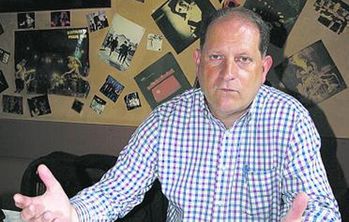A crowd of protesters met again Thursday, May 19 evening, instead of the Puerta del Sol in central Madrid, occupied for three days by thousands of people protesting against the fallout from the economic crisis and unemployment. Responding to appeals on social networks, the demonstrators took turns on Tuesday since the place where they set up a tent city, which continued Thursday to expand and organize.
The Spanish electoral commission (JEC) called Thursday for a ban on street demonstrations during the weekend, during which must be carried on local and regional elections, saying that 'they are contrary to the electoral legislation ". According to Spanish media, the committee voted by five votes against four in favor of the ban to protest after more than six hours of deliberation.
The JEC says it is his duty to ensure "transparency and objectivity of the electoral process and the principle of equality". "During the voting days, our law prohibits any act of electioneering," says the Commission. The interior minister, Alfredo Perez Rubalcaba had earlier said the government was awaiting the decision of the committee to give orders to the police to disperse the demonstrators.
However, he indicated that police "tried to solve problems rather than create. Nicknamed "los indignados" (the indignant), thousands of young Spaniards have gathered for the fifth consecutive day in several cities. This unprecedented move is a milestone in a country where until now people rarely manifested against economic hardship and expressed considerable frustration with the fallout from the crisis and unemployment, which reached a record high of 21.19%, and climbs 45% for the 18-25 age bracket.
The protesters claim very disparate, sometimes confused, denounced the political system dominated by two major parties, socialist and conservative, the "political corruption" and calling for more social justice. Similar rallies, but of lesser magnitude, have been held since the beginning of the week in most major cities in Spain.
According quotidienEl Pais, officials of the youth movement convened a general meeting to decide whether to comply with the ban on demonstrations. But at the Puerta del Sol, Madrid, epicenter of the dispute, the majority of demonstrators have already decided they would continue mobilizing this weekend and asked voters not to vote on Sunday for any of the two major parties in the country, the PSOE (Socialist) government of President José LuisRodriguez Zapatero and PP (right-wing opposition). 


The Spanish electoral commission (JEC) called Thursday for a ban on street demonstrations during the weekend, during which must be carried on local and regional elections, saying that 'they are contrary to the electoral legislation ". According to Spanish media, the committee voted by five votes against four in favor of the ban to protest after more than six hours of deliberation.
The JEC says it is his duty to ensure "transparency and objectivity of the electoral process and the principle of equality". "During the voting days, our law prohibits any act of electioneering," says the Commission. The interior minister, Alfredo Perez Rubalcaba had earlier said the government was awaiting the decision of the committee to give orders to the police to disperse the demonstrators.
However, he indicated that police "tried to solve problems rather than create. Nicknamed "los indignados" (the indignant), thousands of young Spaniards have gathered for the fifth consecutive day in several cities. This unprecedented move is a milestone in a country where until now people rarely manifested against economic hardship and expressed considerable frustration with the fallout from the crisis and unemployment, which reached a record high of 21.19%, and climbs 45% for the 18-25 age bracket.
The protesters claim very disparate, sometimes confused, denounced the political system dominated by two major parties, socialist and conservative, the "political corruption" and calling for more social justice. Similar rallies, but of lesser magnitude, have been held since the beginning of the week in most major cities in Spain.
According quotidienEl Pais, officials of the youth movement convened a general meeting to decide whether to comply with the ban on demonstrations. But at the Puerta del Sol, Madrid, epicenter of the dispute, the majority of demonstrators have already decided they would continue mobilizing this weekend and asked voters not to vote on Sunday for any of the two major parties in the country, the PSOE (Socialist) government of President José LuisRodriguez Zapatero and PP (right-wing opposition).



No comments:
Post a Comment